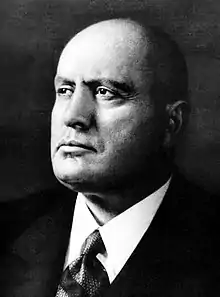Ida Dalser
Ida Irene Dalser (20 August 1880 – 3 December 1937) was the first wife of Italian fascist dictator Benito Mussolini.
Ida Dalser | |
|---|---|
| Born | Ida Irene Dalser 20 August 1880 |
| Died | 3 December 1937 (aged 57) |
| Spouse(s) | |
| Children | Benito Albino Mussolini |
Early life
Ida Dalser was born in Sopramonte, a village near Trento (Trient), which was then within the borders of the County of Tyrol in the Austro-Hungarian Empire. The daughter of the town mayor, she was sent to Paris to study cosmetic medicine. When she returned, she moved to Milan, where she opened a French-style beauty salon.[1]
Marriage and motherhood
It is unclear whether Ida Dalser first met young Benito Mussolini in Trento, where he had found his first job as a journalist in 1909, or in Milan, where he had moved soon afterwards. The two started a relationship, and when Mussolini was refused work on the basis of his fervent socialist political activity, she financed him with the revenues of her beautician job. According to some sources, they married in 1914,[2] and in 1915 she bore him his first child, Benito Albino Mussolini. Though Fascist agents sought to erase all traces of the relationship, an edict from the city of Milan ordering Mussolini to make maintenance payments to "his wife Ida Dalser" and their child was overlooked.[3]
Persecution and death
In 1917, Mussolini came back from the war. His political career accelerated, and in 1919 he went on to found the Fasci italiani di combattimento. In 1921, it became the National Fascist Party, and in the same year, he was also elected to the Chamber of Deputies.
With the 1922 March on Rome, Mussolini seized power and became a dictator who was officially recognised by the reigning House of Savoy.
Once Mussolini was in power, Ida Dalser and her son were placed under surveillance by the police, and paper evidence of their relationship was tracked down to be destroyed by government agents. She persisted in continuing to claim her role as the dictator's wife and even publicly denounced Mussolini as a traitor. She said that during his years in Milan, he had accepted a bribe from the French government, in exchange for political campaigning in support of the involvement of neutral Italy in the war on the side of France.
Eventually, she was transferred to the island of San Clemente in Venice, where she died in 1937. The cause of death was officially given as a "brain hemorrhage".[3]
Fate of Benito Albino
Benito Albino Mussolini was abducted by government agents and was told that his mother was dead. In 1931, he was adopted as an orphan at 15 by the fascist ex-police chief of Sopramonte. Initially educated at a Barnabite college in Moncalieri,[4] he enrolled in the Italian Royal Navy and always remained under close surveillance by the fascist government. Nevertheless, he persisted in stating that Benito Mussolini was his father and was eventually forcibly interned in an asylum in Mombello, Province of Milan, where he was murdered on 26 August 1942 after repeated coma-inducing injections, at 26.[3]
In film
The story of Benito Mussolini's first marriage was suppressed during the fascist rule and remained generally unknown for years afterwards. It was resurrected in 2005 by Italian journalist Marco Zeni and made public in a documentary on RAI state television as well as in two books (L'ultimo filò and La moglie di Mussolini).
Vincere, a biopic on Dalser's life that was directed by Marco Bellocchio and starring Giovanna Mezzogiorno, was screened at the 2009 American Film Institute Festival and in competition at the 2009 Cannes Film Festival.
References
- "La vera storia di Ida Dalser, moglie di Benito Mussolini". Associazione Trentini nel Mondo - Onlus. Archived from the original on 25 April 2012.
- Serena, "L'altra moglie di Mussolini".
- Owen, Richard (13 January 2005). "Power-mad Mussolini sacrificed wife and son". The Times. Archived from the original on 29 June 2011.
- "Fascismo: il figlio segreto di Mussolini". Storia XXI secolo.
Further reading
- Serena, Maria Antonietta (June 1969). "L'"altra moglie" del duce". Historia. Cino del Duca (127): 60–61.
External links
- Owen, Richard (13 January 2005). "Power-mad Mussolini sacrificed wife and son". The Times. Archived from the original on 29 June 2011.
- Il segreto di Mussolini, published by RAI
